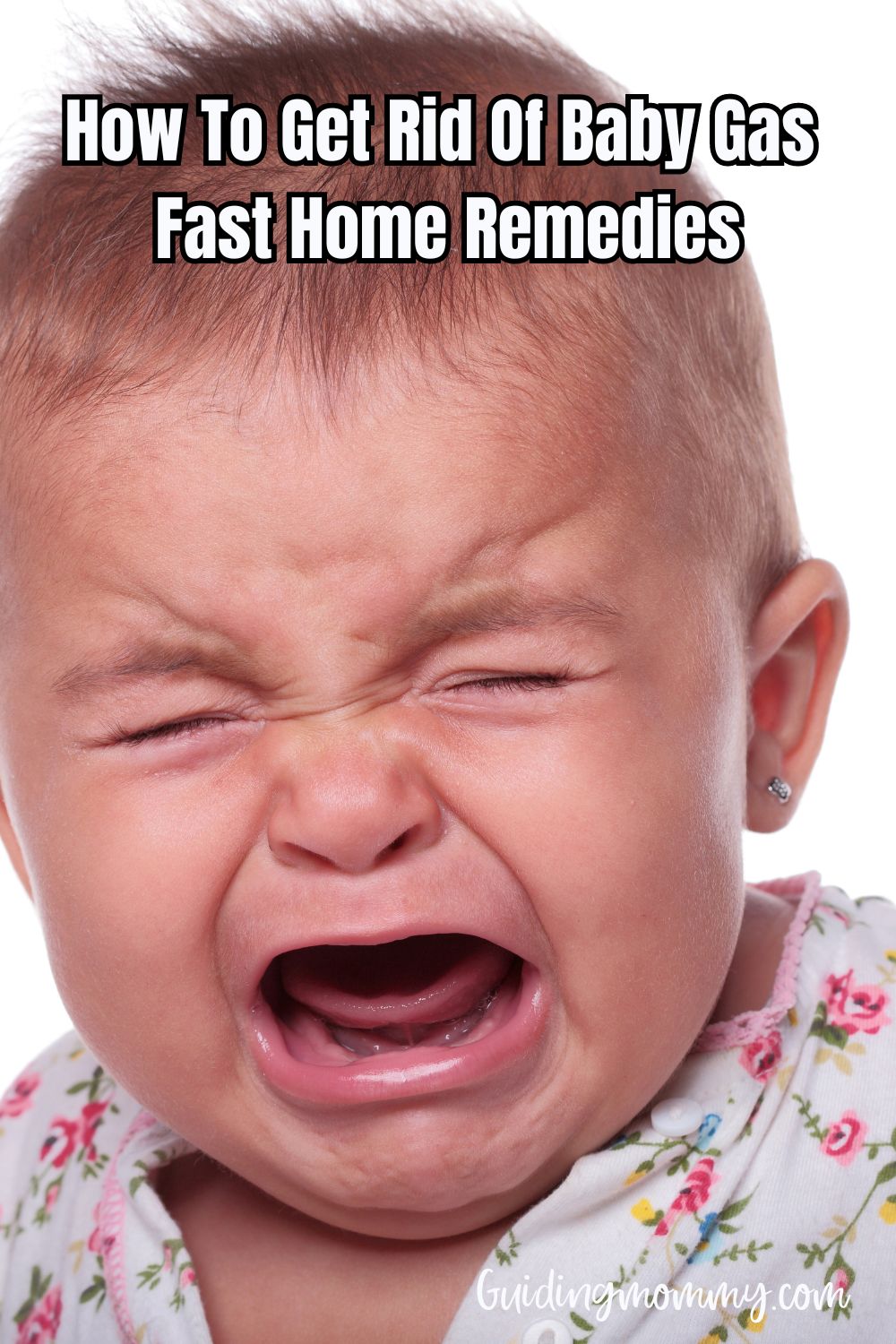Gas can create a lot of problems and discomfort for baby. Here are some fast home remedies on How To Get Rid Of Baby Gas Fast Home Remedies

How To Get Rid Of Baby Gas Fast Home Remedies
Excess gas can make your newborn miserable and colicky. Swallowing air and passing gas isn’t abnormal and relief can be had by following guidelines offered by medical professionals and experienced mothers. There are several ways mothers can help soothe their baby’s discomfort and get rid of the gas problem.
Facts
Discomfort from baby gas is most common in infants three to six weeks old. Gas in breastfed babies develops with their first sip of milk or formula and is a natural process of digestion.
The immature guts of infants are prime sites for gaseous buildup as muscles supporting the digestion process have not matured and the healthy probiotics that aid in breaking down food have not yet developed. Babies may have gas, stomach pain and discomfort if they cry after feedings, have a bloated and hard stomach, are fussy, or are passing a lot of gas.
Attributing a baby’s discomfort to gas can be difficult. A gassy newborn cries often and some of the symptoms of gas pains are similar to other concerns. Sometimes a caregiver thinks gas is the problem with a baby because nothing else seems wrong. A baby’s immature digestive system is somewhat sensitive during the first year of life, making gas more likely. Sometimes persistent or severe gas results because of an underlying health concern, such as food intolerance (lactose intolerance).
Crying And A Fussy Baby
Fussing and crying are a baby’s only methods of communication for much of the first year of life. A sudden cry from a baby followed by silence or whimpering may signal gas pains in the infant’s tummy. Persistent crying can indicate a gas bubble is bothering the baby. The more crying a baby does, the more amount of air the baby swallows, which only increases the build-up of gas.

Facial Expressions Of The Stomach Discomfort
It is often said that a smile from a very young baby is a grimace of sorts due to gas. Many parents shrug off this notion and accept the precious smile as genuine. Unusual or seemingly pain-filled facial expressions can indicate infant gas. The baby may be tolerating the pain or he may be attempting to deal with the sensation he is experiencing, such as trying to push or strain. The baby’s face may become red if he is trying to pass gas. A little grunting may accompany this type of straining.
Refusing Food Because Of A Stomach Ache
A baby may refuse to eat when his tummy hurts. He may attribute the pain to eating or he may just feel too bad to take a bottle or breast. If the baby is crying, can’t be soothed any other way, and refuses to eat, this can indicate gas.
Body Movements Of Gassy Babies
An infant may pull his knees to his chest when gas pains affect him. He may also pull away from touch or seem to be in a great deal of pain when placed on his tummy. He may prefer to sit up or stretch out to relieve some of the pressure in his tummy. The University of Maryland Medical Center suggests a gassy baby may kick a lot and make fists with his hands.
Sounds Of Painful Gas
Gas can cause various sounds to come out of a baby or to occur inside the infant’s stomach. The tummy may gurgle when gas is backed up. The infant may burp or spit up after a long spell of crying. He may pass gas and seem to experience some relief from it.
Stomach Appearance
FamilyDoctor.org suggests that when a baby experiences gas discomfort, his tummy may seem swollen or tight. The belly may feel hard to the touch or firmer than normal.
Natural Remedy For Excess Air
Gassiness in babies is a common occurrence. Most babies become gassy from time to time, while others experience bouts of gas more frequently. Although it does not usually require medical attention, gas build-up and a lot of air in a baby’s stomach can cause increasing discomfort, irritability, and abdominal pain. There are several common causes of infant gas, which can be easily remedied and prevented with home remedies.
Reduce Air Swallowing To Eliminate Baby Gas Pain
Swallowing air can cause infant gas. Nursing babies sometimes swallow air due to poor suction. Adults should help infants latch on properly to prevent this. Bottle feeding with the wrong size nipple can also contribute to air swallowing. During feeds, a parent should position the bottle nipple at a 45-degree angle. Whether bottle or breastfeeding, babies should be burped every few minutes. Excessive crying also causes the swallowing of air; therefore, babies should be fed on time to avoid crying.
When you are nursing your baby, he might swallow air with poor suction. When she takes a bottle, a nipple of the wrong size could also lead to the same problem. To avoid this, when you nurse, try to burp her every few minutes or when you switch breasts. Also, make sure that she is latching on properly. If you bottle feed, make sure the nipple is not too big or too small.
Keep her at about a 45-degree angle during a feeding session and tile the bottle so the nipple is filled with milk. Avoid letting her suck on an empty bottle. You may also try to use one of those bottles that are designed to reduce air swallowing. Excessive crying can also increase air swallowing. Therefore, try to respond to her when she cries and not let her cry too long. Also, try not to wait until she cries to feed her.
Avoid Allergenic Foods
Common foods allergies including soy, wheat, corn, eggs, peanuts, and cow milk protein can promote gas production in babies. Young babies with a family history of food allergies are highly susceptible to excessive gas. In addition, cow’s milk protein transmitted through breastfeeding and other dairy products can cause allergy symptoms, including gas, in babies. Parents and caregivers should try to limit or eliminate allergenic foods to reduce gas production.
Babies who have a family history of food allergy are especially susceptible. Avoid offering your child these foods. If you are breastfeeding and consume dairy products, cow’s milk protein in your diet can pass to your breast milk and cause milk protein allergic reactions in him. It is useful to keep a food journal to record what foods you have eaten. If you suspect a food allergy, try to eliminate that food for 2 to 3 weeks and note any improvement.
Simple Steps To Avoid Foods That Generate The Gas
If your baby has started solid foods, eating foods that generate gas could be the culprit. Try to avoid serving him gas-producing foods such as fiber-rich foods, beans, cauliflower, cabbage, and bran.
Baby Tummy Massage And Exercise May Offer A Little Help
Giving your baby a massage, especially around her tummy area, could relieve gassiness. Simply apply light pressure on her tummy. Also, try gentle exercises to help relieve gas. Lay your baby on her back and then gently move her legs back and forth a few times.
Other Gas Remedies For Baby Gas Relief
Parents should also avoid feeding their babies foods that generate gas. Gas is a common occurrence in babies starting a solid food diet. Gas-producing foods include beans, cabbage, cauliflower, bran, and other fiber-rich foods. Massaging a baby with gentle pressure around her tummy area can help to relieve gas and promote healthy digestive activity. Placing the baby on her back and gently bending her knees and maneuvering her legs in various ways may contribute to pushing gas bubbles out of the stomach and intestines.
Gasiness in babies is a common problem and generally does not require medical attention. Some of the common causes include poor suckling or swallowing technique, allergies, excessive crying, and an immature gastrointestinal system. The gas build-up in your baby’s tummy can cause discomfort and makes him colicky. Fortunately, there are remedies you can use to prevent or relieve your baby’s gassiness.


